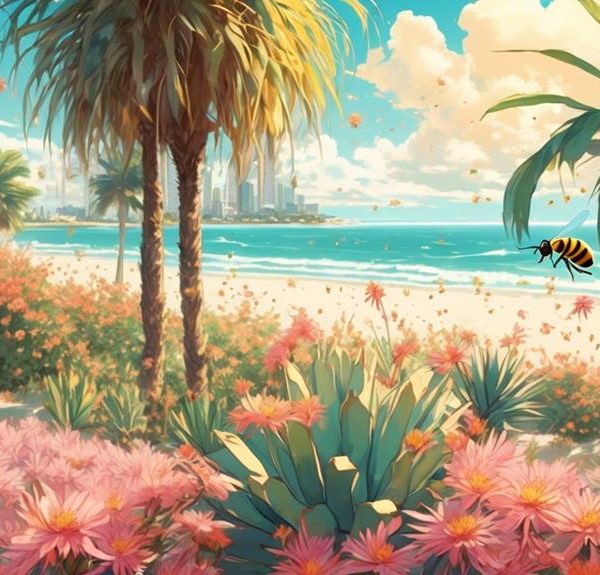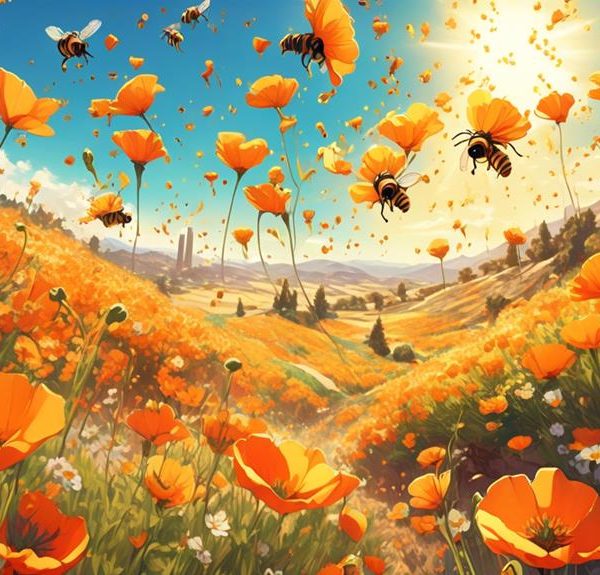Open your eyes to the fascinating world of bees and their surprising relationship with caffeine – a delightful intersection of nature and neuroscience.
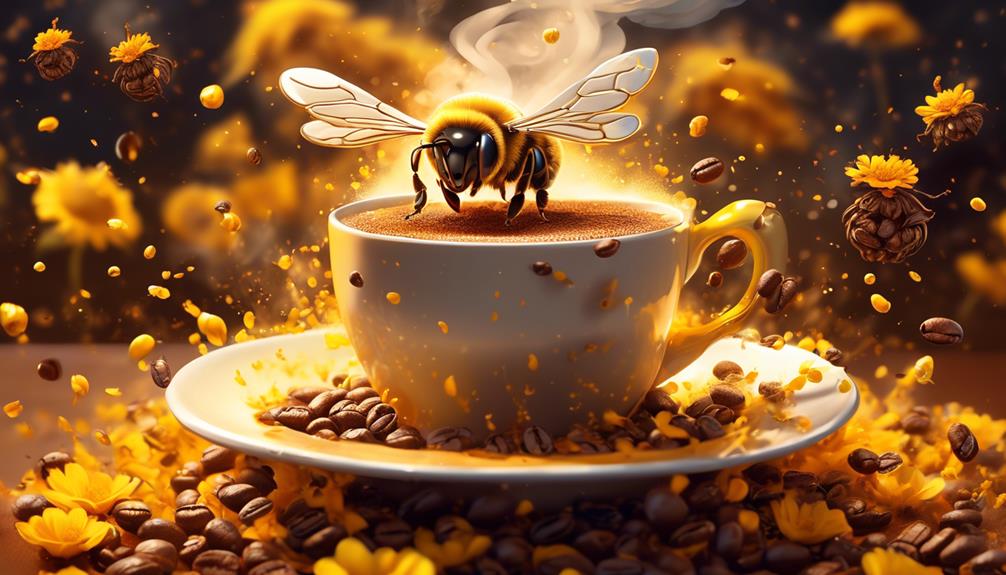
Do Bees Like Caffeine
Imagine the early morning light breaking over a field of wildflowers, the air filled with the gentle hum of bees. You've always associated these industrious creatures with honey and pollination, but have you ever considered their relationship with caffeine?
It's a curious thought, isn't it? Research has shown that caffeine, a substance we humans often rely on to kickstart our day, is also found in the nectar of certain plants.
But does this mean bees are drawn to caffeinated nectar in the same way we're drawn to our morning cup of joe?
Well, let's pull back the curtain a little to explore this intriguing intersection of nature and neuroscience.
Key Takeaways
- Bees are more likely to remember and return to plants that produce nectar containing caffeine.
- Caffeine in nectar enhances bees' memory and foraging patterns, leading to increased nectar collection and pollination.
- Bees show a preference for flowers with caffeinated nectar in memory-based experiments, indicating caffeine's positive effect on their recall ability.
- The presence of caffeine in nectar can alter plant-pollinator interactions, potentially leading to imbalanced pollination patterns and changes in ecosystem dynamics.
Understanding Bee Attraction to Plants
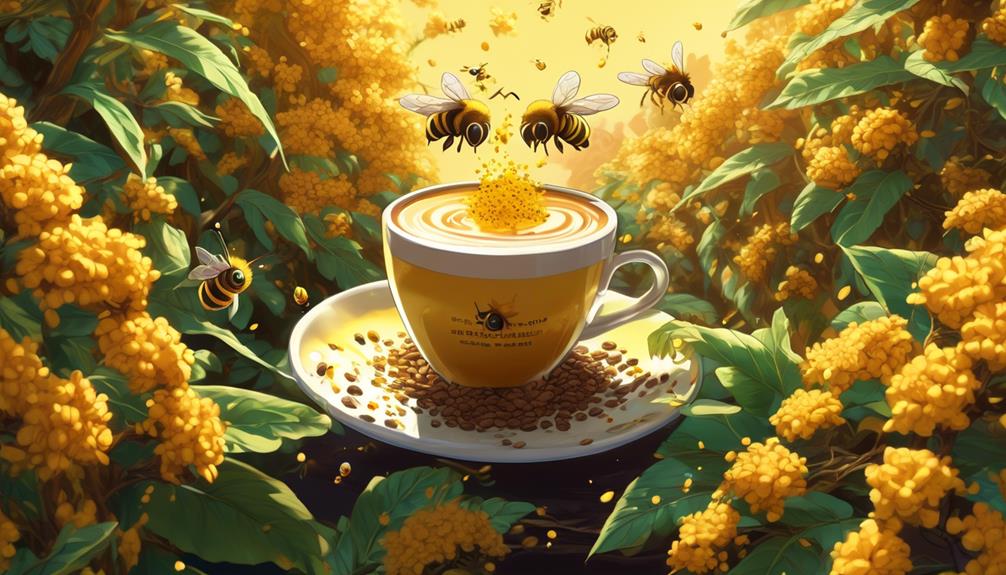
Delving into the realm of bee attraction to plants, you'll find that these industrious insects aren't just randomly buzzing from flower to flower; rather, they're seeking out specific plants based on a variety of factors, including the presence of caffeine in nectar. This attraction isn't haphazard, but rather a complex interplay of chemical signals and innate bee preferences.
Scientific studies have shown that bees are more likely to remember a plant's location if its nectar contains caffeine. It's as if the caffeine jogs their memory, making them more efficient at finding and collecting nectar. This isn't just beneficial for the bees, but also for the plants. By attracting bees, they ensure their flowers get pollinated, enabling them to reproduce.
But it's not just caffeine that attracts bees. They're also drawn to plants with bright, contrasting colours and strong fragrances, which serve as visual and olfactory cues. The shape and structure of the flower also play a role. Bees prefer flowers with landing platforms and tubular shapes that allow them to access the nectar while simultaneously picking up pollen. Understanding these factors is critical in deciphering the intricate relationship between bees and plants.
The Role of Caffeine in Nectar
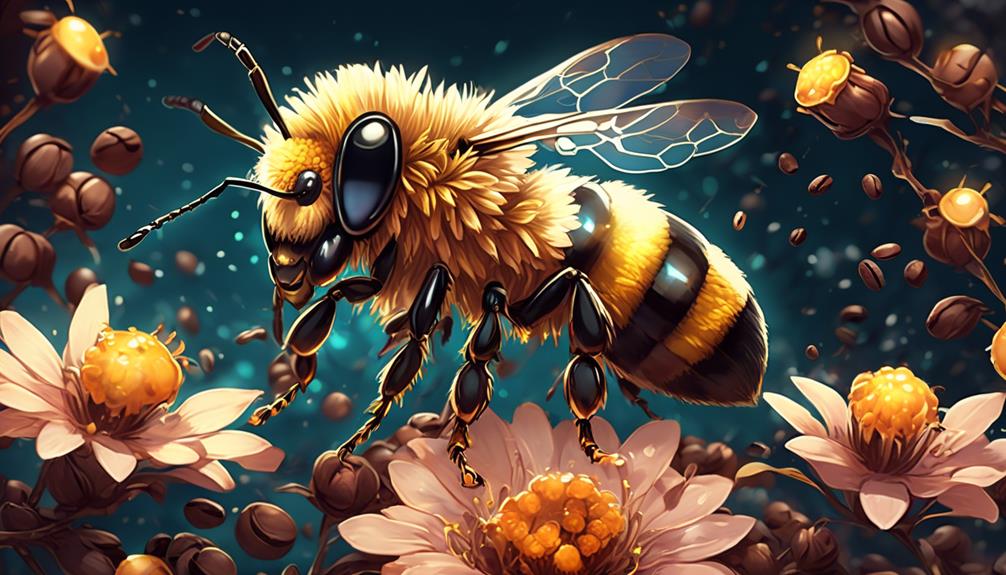
In the dance of pollination, caffeine serves as a potent memory enhancer for bees, fundamentally altering their nectar foraging patterns. This natural stimulant, found in varying degrees in plant nectar, encourages bees to return to the caffeinated flowers more often, enhancing the pollination process.
But how does this work? When bees feed on nectar containing caffeine, it stimulates their brain, making the memory of the flower's scent stronger. As a result, they're more likely to remember and return to these caffeine-rich flowers.
Here's a simple breakdown:
Aspect | Without Caffeine | With Caffeine |
|---|---|---|
Bee's Memory | Average | Enhanced |
Visit Frequency | Regular | Increased |
Nectar Collection | Normal | High |
Pollination Rate | Standard | Boosted |
This table shows the stark contrast between a bee's behavior with and without caffeine. It's a fascinating dance of nature, isn't it? Caffeine, often seen as a simple stimulant for humans, plays an integral part in the complex world of bees and plants. Now, isn't that a buzz-worthy fact?
How Bees React to Caffeinated Nectar
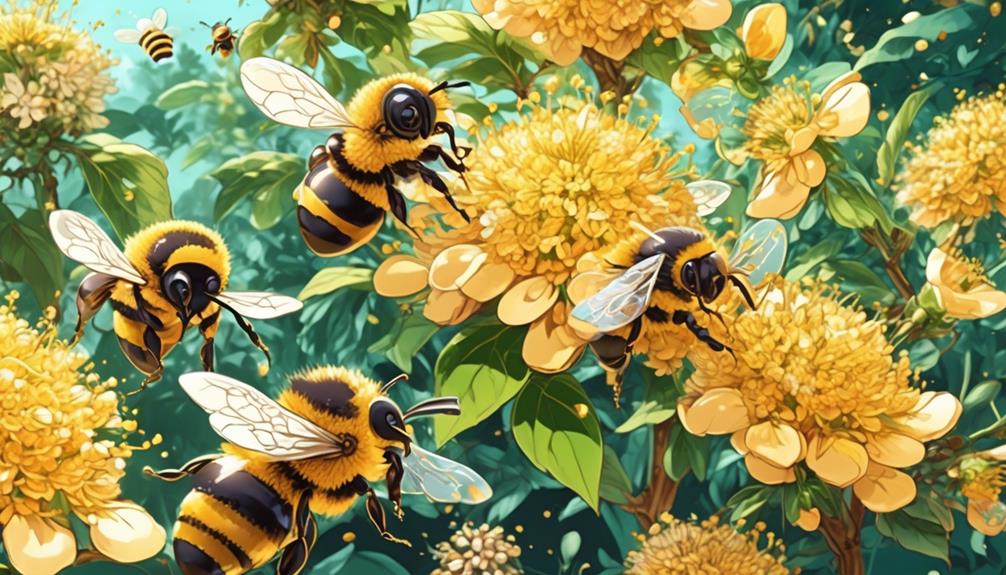
Understanding the reactions of bees to caffeinated nectar offers a deeper insight into their foraging behavior, cognitive function, and the overall efficiency of pollination. You'll find that bees, much like humans, exhibit a sort of 'caffeine buzz'. It's observed that when bees encounter caffeinated nectar, they're more likely to remember the scent of that flower, improving their foraging efficiency.
You might be wondering what's the mechanism behind this. Well, caffeine seems to affect the bees' kenyon cells – the part of their brain that provides a sense of smell and memory. This stimulation makes the bees more likely to remember and return to that same nectar source.
But here's the catch: while bees get a memory boost, this doesn't always translate to a nutritional one. Some flowers trick bees with their caffeine content, offering less nectar overall. This means bees expend more energy returning to these less bountiful sources. The effect? An imbalance in pollination patterns.
Caffeine's Effect on Bee Memory
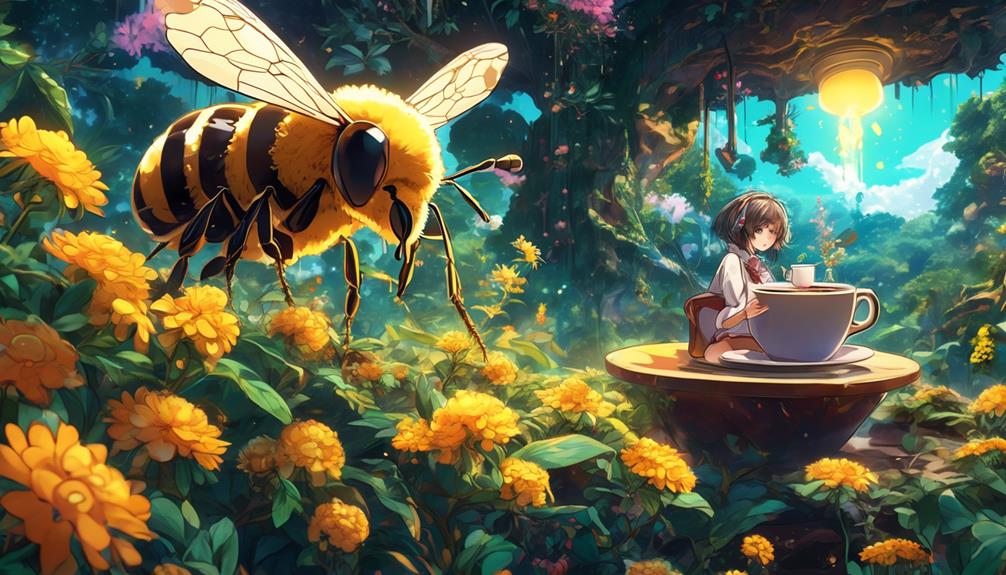
Shifting our focus to the role of caffeine in bee memory, it's clear that this natural stimulant significantly impacts their recall ability, especially when it comes to foraging tasks. Studies reveal caffeine enhances the bees' ability to remember the location of flowers. This is crucial as bees typically explore vast areas to collect nectar and pollen.
Consider the experiment where bees were presented with two artificial flowers – one with caffeinated nectar and the other caffeine-free. The bees were then released to their hives. When they returned, they opted for the flower with the caffeinated nectar, indicating a preference likely influenced by memory enhancement.
Implications for Ecosystem Dynamics
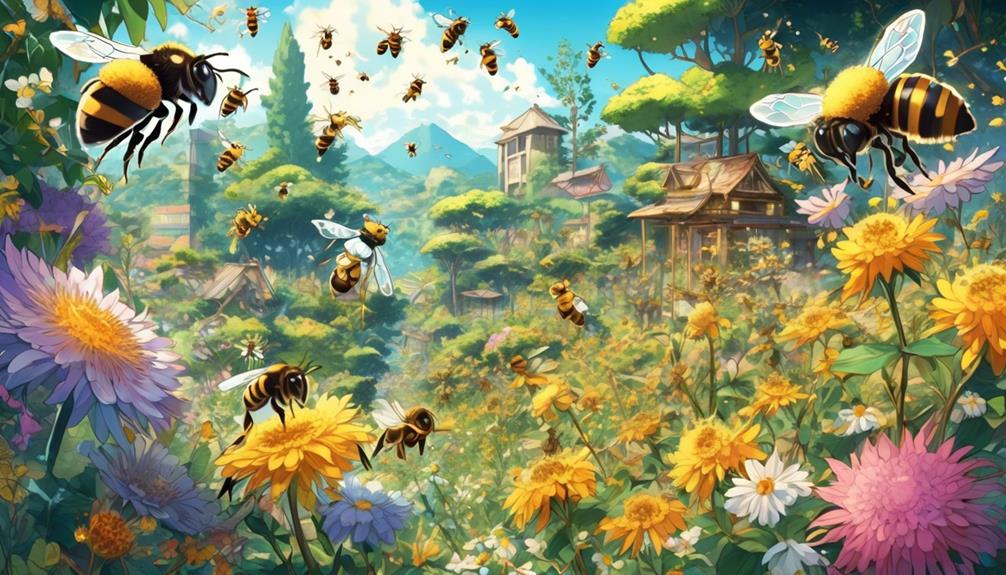
Delving into the implications for ecosystem dynamics, you'll find that bees' caffeine-induced memory enhancement can significantly alter plant-pollinator interactions and overall biodiversity. Bees, enticed by caffeinated nectar's reward, may focus on those plants, leading to a skewed pollination pattern. This could result in a reduction of plant diversity over time, as bees favor caffeine-producing plants.
Imagine this in a broader ecological context. Changes in pollination dynamics could influence the structure and composition of plant communities, potentially impacting other organisms that depend on those plants for food and habitat.
To help you grasp these potential impacts, consider this table:
Potential Impact | Explanation |
|---|---|
Skewed Pollination | Bees may favor caffeine-producing plants, altering pollination patterns. |
Reduced Plant Diversity | With bees favoring certain plants, others may see reduced pollination, impacting their propagation. |
Changed Plant Communities | Changes in plant composition could affect entire ecosystems. |
Impacted Food Chains | Changes at the base of the food chain could have cascading effects on higher trophic levels. |
You see, the ramifications of caffeine's allure go beyond a simple bee-plant interaction, potentially reshaping entire ecosystems.
Frequently Asked Questions
How Does Caffeine Affect the Lifespan of Bees?
Caffeine impacts a bee's lifespan in interesting ways. It boosts their long-term memory, making them more efficient at locating flowers and collecting nectar. This increased productivity could potentially extend their lifespan.
However, high amounts of caffeine can be toxic to bees. It's a delicate balance. So, while a little caffeine can enhance a bee's life, too much can be detrimental.
It's like many things in life – moderation is key.
Can Caffeine Affect the Reproduction Process of Bees?
Yes, caffeine can impact the reproduction process of bees.
It's found that caffeine can alter the behavior of worker bees, making them more efficient pollinators.
However, it's not clear if this increased efficiency translates to increased reproduction.
There's also some evidence that caffeine can negatively affect the lifespan of bees, which could indirectly influence reproduction.
Further research is needed to fully understand the relationship between caffeine and bee reproduction.
Do Other Insects Also Show Attraction Towards Caffeinated Nectar?
Yes, other insects do show attraction towards caffeinated nectar, similar to bees.
It's not just bees that get a buzz from caffeine. Recent research shows that other insects like butterflies and moths also gravitate towards plants with caffeinated nectar.
It appears caffeine enhances their memory and learning abilities, encouraging them to revisit.
What Is the Nutritional Value of Caffeinated Nectar for Bees?
You're asking about the nutritional value of caffeinated nectar for bees. It's not about nutrition, but attraction. Caffeine doesn't add nutritional value to a bee's diet.
Instead, it tricks bees into thinking the nectar's higher quality, making them return to the same plants. This helps plants with caffeinated nectar spread their pollen more effectively.
Are There Any Negative Effects of Caffeine on the Bee's Behavior or Health?
Yes, there can be negative effects of caffeine on a bee's behavior and health.
It's similar to how caffeine affects humans. While it may boost their memory and help them return to a food source, too much can overstimulate them.
This can lead to restlessness, disrupted sleep patterns, and even a shortened lifespan.
Conclusion
So, yes, bees do like caffeine. It's not just a random preference either. Caffeinated nectar enhances their memory recall, making them more efficient pollinators.
However, it's not all roses. Plants using caffeine could manipulate bee behavior, potentially disrupting ecosystem dynamics.
It's a fascinating reminder that even in the smallest interactions, there's a complex dance of attraction, manipulation, and survival.
Nature's coffee shop, it seems, is quite the buzzing place.

